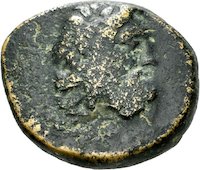
"Asclepius (/æsˈkliːpiəs/; Greek: Ἀσκληπιός Asklēpiós [asklɛːpiós]; Latin: Aesculapius) or Hepius is a hero and god of medicine in ancient Greek religion and mythology. He is the son of Apollo and Coronis (or Arsinoe). Asclepius represents the healing aspect of the medical arts; his daughters are Hygieia ("Hygiene", the goddess/personification of health, cleanliness, and sanitation), Iaso (the goddess of recuperation from illness), Aceso (the goddess of the healing process), Aegle (the goddess of the glow of good health), and Panacea (the goddess of universal remedy). He was associated with the Roman/Etruscan god Vediovis and the Egyptian Imhotep. He was one of Apollo´s sons, sharing with Apollo the epithet Paean ("the Healer"). There is no agreement whether Asclepius was divine or he received that status after Zeus struck him down. The rod of Asclepius, a snake-entwined staff, remains a symbol of medicine today. Those physicians and attendants who served this god were known as the Therapeutae of Asclepius." - (en.wikipedia.org 16.10.2019)





